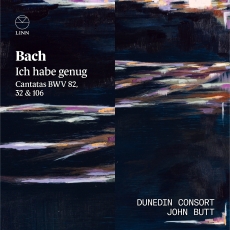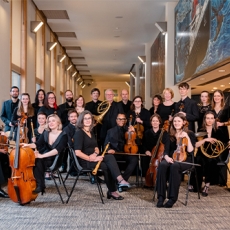Dunedin Consort - Bach: Ich habe genug - MusicWeb International [ST]
Bach’s cantatas are now such a key part of our musical lives that it can be difficult to think of a time when they lay forgotten and neglected in archives somewhere. We now see them as central to his output, ranking alongside the Passions as statements of his faith. There are few more worthy Bachians on the UK’s shores than the crack team of the Dunedin Consort and in this, their first disc devoted completely to Bach’s cantatas, they demonstrate both their own remarkable skill and the universality of the music they bring to life.
Loss and consolation are at the heart of all three works, and Ich habe genug addresses that so effectively that you can understand why it was one of the first of the composer’s cantatas to be rediscovered, with recordings going back as far as the venerable Hans Hotter and beyond. John Butt and his team are worthy to take their place alongside such prestigious predecessors. The soft bed of strings that underpins so much of the music sounds at once melancholy and inviting in the first movement, sweetening into something blissful for the central aria “Schlummert ein”, and the gorgeous oboe solo of Alexandra Bellamy, rightly credited as co-soloist, pours out tone of liquid beauty, weaving its way seductively around the vocal line. Matthew Brook’s air of vulnerability makes him an all but ideal singer for this work, and his empathy with the text is as important as his understanding of the notes. He articulates every syllable with thoughtfulness and care, turning it into the prayer that it is, managing gorgeous, open vowel sounds on words like “glaube” or “bleibe”. His tone combines warmth and richness with flexibility, so that the first movement is full of resolution and determination, while the second is set with calm resolution, with a particularly poignant pause on “stille Ruh.” He spins a long line of breath control through the endless semiquavers of the final aria, summoning energy to sit alongside resignation. Director John Butt weaves the whole together with mastery that he wears very lightly, judging the tempi and firmness of line in a way that sounds just right. The final passepied is irresistible, catchy in its rhythmic urgency.
BWV 32 is a fascinating companion piece, moving in a similar emotional direction, but with two soloists representing Christ and the believer. The string chords of the opening sound like stabs of anguish to mirror the soul’s sense of loss, and Joanne Lunn’s voice is perfect for this piece; richly beautiful, but also poignant, capturing the sense of loss and distress. Even more than in Ich habe genug, the first movement becomes a duet with the oboe. Brook sounds every bit as good in this cantata, too, but this time his voice is the voice of faith and certainty as he represents Christ, and there is a wonderful sense of joy and consummation in the fifth movement duet when soul and saviour come together in celebration.
However, the highlight, for me, is the Actus Tragicus, most likely written twenty years earlier when the young Bach was organist at Mühlhausen. It’s one of my favourites among Bach’s cantatas anyway because everything, from its instrumentation to its structure, mirrors its message of moving from darkness into light, from the old covenant into the new. It’s performed beautifully here. The tread of the opening Sonatina is quietly purposeful, not overly deliberate, and the sound of the pair of recorders is both beautiful and inexplicably poignant, those microtones where they go slightly out of tune giving them a desperate air of vulnerability. Everyone has their own view on one-to-a-part Bach, but the four singers of this chorus sound great, the spare textures of their choral moments giving them a very human sense of fragility. They’re super in their solos, too, tenor Hugo Hymas and alto Katie Bray sounding particularly moving. It’s also here that the quality of Linn’s recording really comes into its own, each instrument clearly audible. There’s an excellent balance with the voices, and the reedy organ sounds fantastic, too.
I’ve read several commentators who have described this as a “covid disc” and, indeed, it’s poignant to reflect that they were recording this just as the Kent/Alpha variant was taking hold and, unbeknown to most of us, the UK was about to enter its second severe lockdown and the worst stage of the pandemic. However, to describe it thus misses the main matter: the whole point of Bach’s cantatas, like the Biblical texts from which they spring, is to meditate on the universal truths to which they point, and what could be more universal than the inevitability of death and its impact on us all? So in that sense this is a covid disc, but it’s also a disc at which to marvel and draw consolation at all times.


